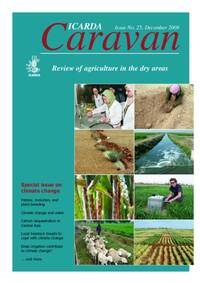Caravan 25: Special issue on climate change

Authors:
This issue of Caravan describes some of ICARDA's work on climate change. It contains overviews of the key issues, and articles describing research in specific areas. We examine, for example, how genetic resources – landrace varieties, wild relatives, indigenous livestock breeds – can be used to make small-scale agriculture better adapted to a changed climate. We discuss the implications of climate change on the evolution and spread of plant pathogens, on policy options for improving rural livelihoods, and on centuries-old patterns of livestock migration. We describe low-cost technologies to improve water management in the face of growing scarcity. We illustrate how remote sensing and geographic information systems can help identify climate change 'hot spots' and analyze long-term changes in the
environment. We discuss soil carbon and carbon sequestration in the context of developing-country agriculture. We identify lessons learnt in dry areas in West Africa, that could be put to use elsewhere.
